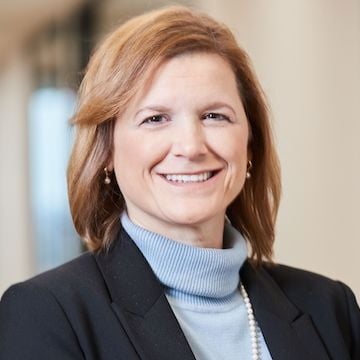From pandemic-induced remote learning to historic winter storms, K-12 education decision makers in Arkansas, Texas and Tennessee have faced an enormous amount of critical challenges over the past 12 months. And despite all of these transformative changes, one thing remains constant: that brick-and-mortar educational institutions are still essential knowledge centers to school districts across the U.S.
Leigh Ann Biernat, a Certified Public Accountant and Senior Vice President in the Public Finance team at Stephens Inc., co-hosts the team’s inaugural webinar in its new virtual thought leadership series, Capital Thinking: Public Finance Insights for Today’s Market. The webinar series explores the challenges and opportunities affecting capital projects for state, municipal and county government transactions. This first entry focuses on a national perspective on funding K-12 education capital projects. Alfred Ray, a Vice President at Stephens Public Finance who holds a Ph.D. in educational administration and spent 30 years in public education in Texas, serves as co-host with Ms. Biernat. In the webinar, they speak with three expert panelists: David Woolly, Superintendent of the Alma School District in Arkansas and former Vice Chair of the Board of Directors of the Arkansas Public School Computer Network; Johnny Hill, Chief Financial Officer at the Allen Independent School District in Texas and a CPA; and Dr. Donna Wright, the Wilson County Director of Schools in Tennessee.
The panel discusses the impact of the COVID-19 pandemic and other disasters, remote learning, common funding hurdles, political considerations, as well as how to achieve efficiencies in funding K-12 education capital projects. Here are a few key highlights.
ALMA SCHOOL DISTRICT—Arkansas
Mr. Woolly says Alma School District was in the midst of planning for refunding and restructuring bonds to lower its annual payment, and generating additional funds for a small construction project when the pandemic struck in March 2020. After reassessing due to COVID-19 and making certain changes regarding HVAC and construction, Alma School District presented the plan to voters. The plan included a reduction in property taxes paid by the citizens and it was approved in November. The district also was able to use financial support from the CARES Act, Mr. Woolly says.
Regarding the political landscape, he says that school districts must be prepared to make the case to taxpayers that funding new K-12 education capital projects are still worthwhile. This entails explaining to voters how lack of taxpayer funding will likely affect students and teachers long-term, down to details such as whether or not children will be able to have air conditioning while in school.
ALLEN ISD—Texas
Mr. Hill says Allen Independent School District went 100 percent remote for the remainder of 2020 shortly after COVID-19 was declared a pandemic in the United States, by leveraging technology that already was in place. Allen ISD spent millions of dollars to upgrade school building ventilation and filtration systems, adding signage throughout common areas to guide students on social distancing, and purchasing personal protective equipment.
Winter Storm Uri, which battered Texas in February 2021 and damaged the state’s power grid, has had knock-on political ramifications for the district, Mr. Hill says. As state legislators have struggled to meet budgeting needs for Texas, Allen ISD has sought to become more efficient with operations — cutting $6 million from its own budget—in anticipation of receiving less state-level funding over the next couple years.
WILSON COUNTY SCHOOLS—Tennessee
Dr. Wright says a devastating tornado, which hit Wilson County two weeks before the pandemic, had greatly damaged a middle school and an elementary school in the district, displacing 1,700 students and 150 staff members. This unexpected disaster forced Wilson County Schools to solve financial and logistical needs for supporting those students and staff remotely. Among other things, this required taking steps to improve their access to highspeed broadband internet.
A high-performing school district must be especially aware of political issues, Dr. Wright says, because they often have to manage public awareness that the district is a good steward of tax dollars on the local, state and federal levels. This may be accomplished by retaining highly qualified and effective teachers, and demonstrating continued growth of a successful student population. Taking this approach during good economic times can alleviate some of the political challenges of funding K-12 education that arise during bad economic times, she says.
WATCH THE WEBINAR TODAY
You can watch the full webinar from Stephens Public Finance, A National Perspective on Funding K-12 Education Capital Projects, at: capital-thinking-public-finance-insights-fortodays-market.videoshowcase.net
Please be sure to return for future entries in this new webinar series, Capital Thinking: Public Finance Insights for Today’s Market.
About the Expert

Leigh Ann Biernat, CPA
Executive Vice President, Head of Public Finance, Public Finance Read full bio- This article was prepared for informative purposes only and is not an offer to buy or sell any securities. It does not purport to be a complete description of the securities, markets or developments referred to in the article or to include all information needed to evaluate any transaction. Information contained in the article was derived from sources considered reliable, but has not been independently confirmed or verified. The opinions expressed are the personal opinions of the author. These opinions do not necessarily reflect the opinions of any other person or entity, and they are subject to change without notice.